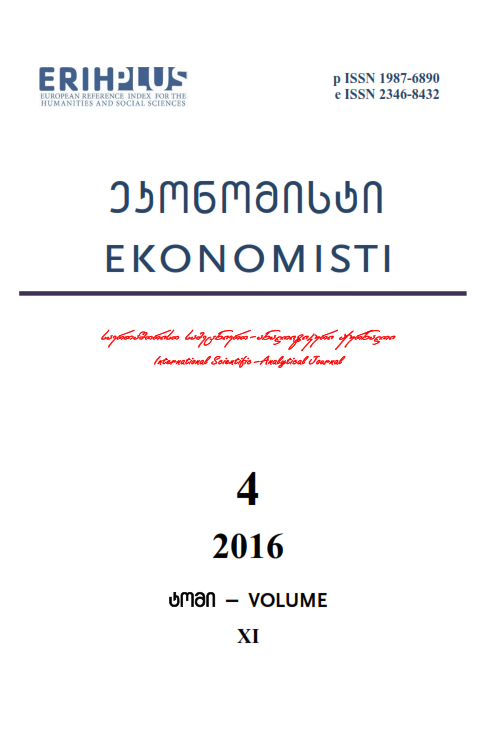
The international scientific and analytical, reviewed, printing and electronic journal of Paata Gugushvili Institute of Economics of Ivane Javakhishvili Tbilisi State University

Georgias role in the demonopolization of the European gas market
Expanded Summary
The article discusses the role of the Southern Gas Corridor of the European Union in ensuring the economic security of Georgia. The study of the influence of energy resources on economic security is especially important in modern Georgia, if we take into account that currently, against the background of the ongoing Ukraine-Russia war, the European Union is actively considering the replacement of Russia-Ukraine transit routes with the southern gas corridor, which also passes through Georgia in the form of the "South Caucasian Gas Pipeline" built in 2007. It should be noted that in July 2022, the Prime Minister of Georgia was on a state visit to Kazakhstan and Turkmenistan, during which the prospect of further strengthening of Georgia's transit capacity was discussed.
The article discusses the economic cooperation of the European Union with Georgia in the field of energy, in particular, gas; as well as those geopolitical and geoeconomic factors that directly/indirectly affect the political/economic cooperation of the European Union and Georgia. The article focused on the foreign economic relations of Georgia not only in relation to the politics of big countries, but also considering the economic security factors of our country. In this context, the country's energy-transit potential is of prime importance, which largely affects the country's foreign economic course. Specifically, the line understands the possible impact of the EU's Southern Gas Corridor on Georgia's economic security.
The above-mentioned topic is particularly interesting in relation to Georgia, because Georgia, due to its geopolitical/geoeconomic importance, is a sphere of special interest of the Russian Federation and the Western countries (great powers). It should be noted that Russia is interested in preventing the strengthening of Western energy interests in the South Caucasus. As a result, the foreign policy course chosen by Georgia is important not only for the region, but also for the world, which creates additional risks in terms of protecting the country's economic security.
The role of energy resources in modern world economic security is becoming more and more important. Taking into account the events that have happened in the last decade (especially the numerous conflicts between Russia and Ukraine, which threatened the energy security of the big European powers, as well as the conflict in Karabakh and the 2008 Russia-Georgia war), it is clear that the energy and transit potential of the country is no less important in terms of security than its military, or any other resource.
The purpose of the article is to determine what role the Southern Gas Corridor of the European Union can play in relation to the economic security of Georgia. Thus, the problems discussed in the paper answer the main research question: what will be the impact of the strengthening of the Southern Gas Corridor of the European Union on the economic security of Georgia? Based on the main research question, the article also answers additional questions: What role does natural gas play in strengthening the economic security of Georgia? What role does the Southern Gas Corridor play in Georgia-EU economic security cooperation?
In today's situation, the place where the western routes of Caspian gas pass is Georgia. In particular, the "South Caucasus Gas Pipeline" (SCP) has been running through Georgia since 2007, through which gas is pumped from the Caspian "Shah Deniz". Georgia receives 5% of gas from SCP for free (in the form of gas transit fee) and 5% at a preferential price.
This gas passing through the SCP is sent via the "Trans-Anatolian Gas Pipeline" (TANAP) and the "Trans-Adriatic Gas Pipeline" (TAP) from Turkey to Europe as a single EU "Southern Gas Corridor" (SGC).
The Russia-Ukraine war has disrupted the global supply chains and weakened the world economy, but it presents a new opportunity for Azerbaijan. In particular, with the US and Europe imposing sanctions on Russian oil and natural gas, Azerbaijan has a chance to increase gas exports by the end of 2022 and beyond through the 3,500-kilometer Southern Gas Corridor (SGC), which passes through seven countries and supplies gas to southern Europe. Azerbaijan currently supplies 10 billion cubic meters of gas to Europe and 6 billion cubic meters to Turkey through the SGC annualy.
To meet Europe's growing demand, Azerbaijan is also developing two new gas fields and is open to investment to expand SGC's capacity, namely by installing additional compressor stations to double gas flow. However, according to Azerbaijan's Ministry of Economy, "reduced investment" from Europe could slow the country's efforts to increase supply. Thus:
- The role of the "Southern Gas Corridor" will further increase in the context of the Russia-Ukraine war and, therefore, the transit importance of Georgia for the energy security of the European Union;
- "Corridor" will provide the Caspian countries with new, increased opportunities to export energy resources to the world market and will have a significant impact on the security and stability of the region.
Keywords: European Union, Georgia's energy security, Russia-Ukraine war, Southern gas corridor, South Caucasian gas pipeline, Caspian fields, Azerbaijan, demonopolization.
